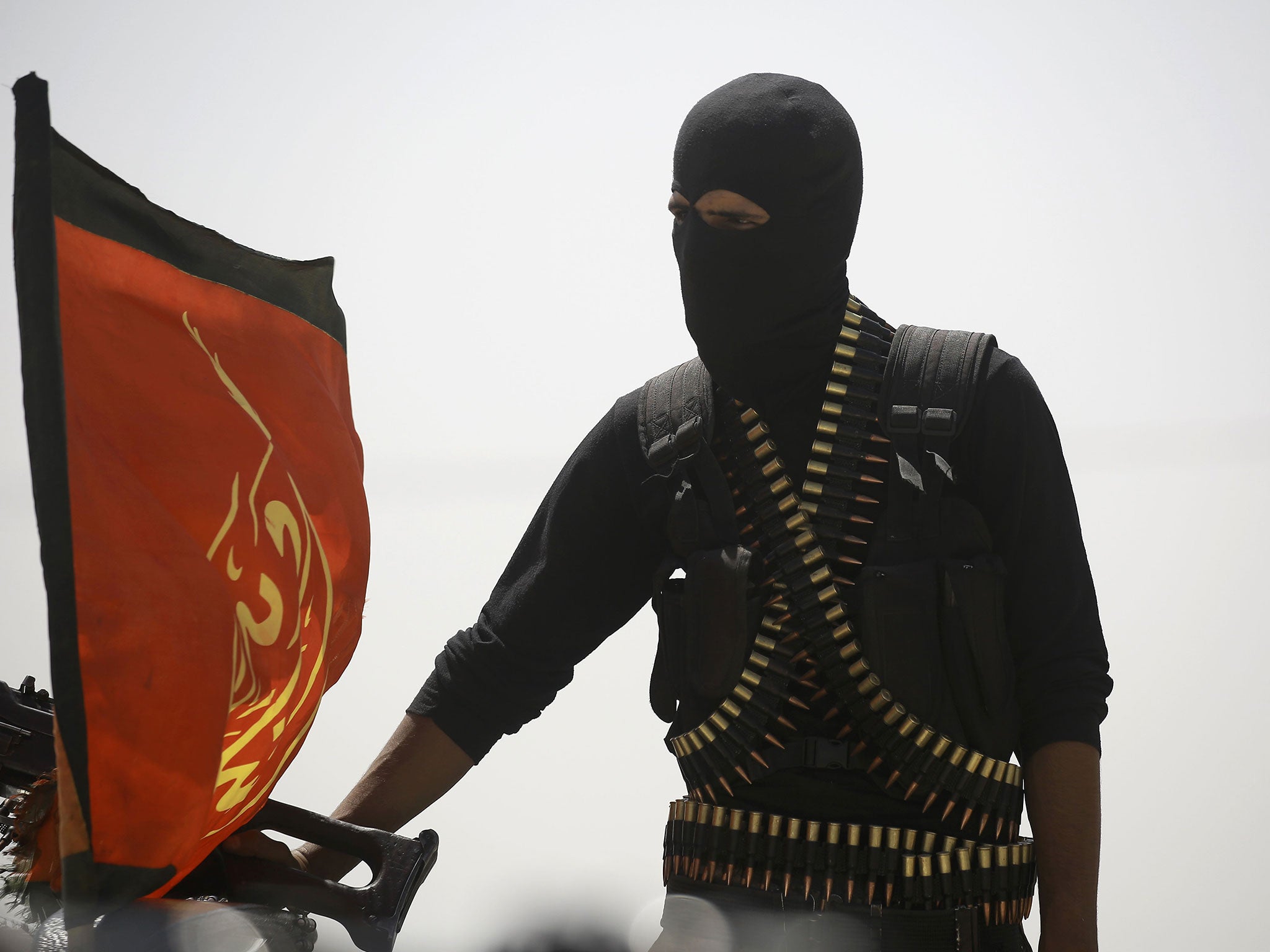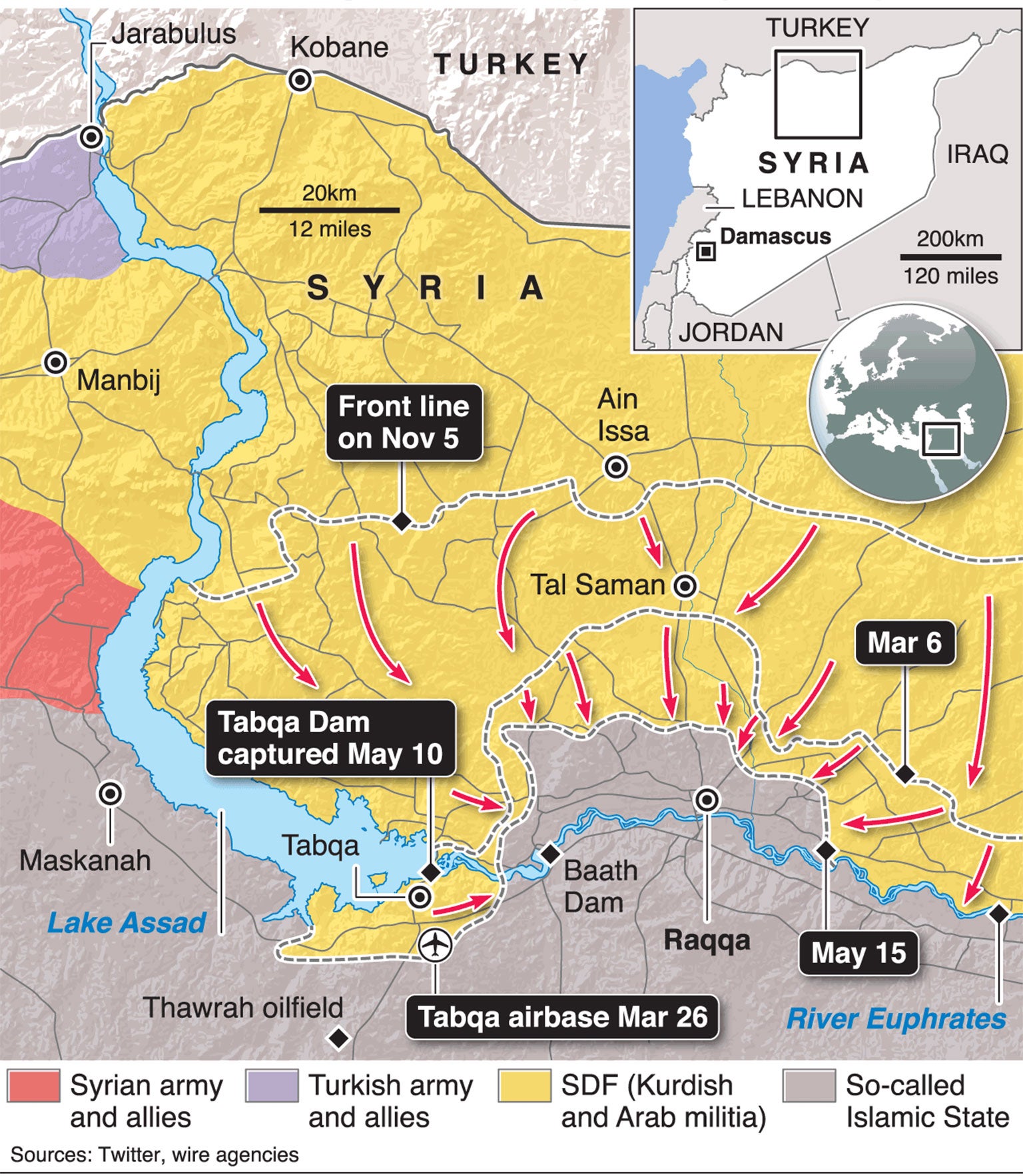Battle to liberate Raqqa from Isis 'will be over quicker than Mosul'
Exclusive: Speaking to The Independent, an SDF fighter on the front line says the geographical nature of Isis's de facto capital in Syria will make it harder for the jihadis to defend

Your support helps us to tell the story
From reproductive rights to climate change to Big Tech, The Independent is on the ground when the story is developing. Whether it's investigating the financials of Elon Musk's pro-Trump PAC or producing our latest documentary, 'The A Word', which shines a light on the American women fighting for reproductive rights, we know how important it is to parse out the facts from the messaging.
At such a critical moment in US history, we need reporters on the ground. Your donation allows us to keep sending journalists to speak to both sides of the story.
The Independent is trusted by Americans across the entire political spectrum. And unlike many other quality news outlets, we choose not to lock Americans out of our reporting and analysis with paywalls. We believe quality journalism should be available to everyone, paid for by those who can afford it.
Your support makes all the difference.“I do not think the siege of Raqqa will be as long as Mosul,” says Awad, an Arab fighter in the US-backed Syrian Democratic Forces (SDF), who belongs to a military unit attacking Raqqa, the de facto capital of Isis in Syria. In an exclusive interview with The Independent, he says that “we are advancing quickly and the geographical nature of Raqqa is different from Mosul”.
The SDF has launched the crucial battle for Raqqa, a city with a population of 300,000 on the north bank of the Euphrates, after a long delay imposed by threats of military intervention by Turkey, which denounces the 45,000-strong SDF as “terrorists” dominated by the Syrian Kurds. The Turkish priority is to prevent the consolidation of a quasi-independent Kurdish statelet in northern Syria. Turkish Prime Minister Binali Yildirim today hinted strongly at Turkish military intervention, saying that “we will immediately give the necessary response if we come across a situation in Raqqa ... that threatens our security”.
Awad, 32, comes from Raqqa but fled to Tabqa to the west of the city last year before it was captured by the SDF and four months ago joined the SDF, which the US says has 13,000 Arab fighters in its ranks. In a phone interview, he gives a vivid description of conditions on the front line, which the SDF Raqqa Operations Room says is 3km away from Raqqa to the west and north and 1km away to the east. The US estimates that there are between 3,000 and 4,000 Isis fighters in Raqqa, who are isolated there because US coalition air strikes on 3 February destroyed the last two bridges linking it to the south bank of the Euphrates. The fighters can only cross the river by boats, but they would then be vulnerable to air attack.
“They [Isis] are mostly withdrawing [into Raqqa], though some are fighting fiercely and do not leave their positions until they are killed,” says Awad. “We killed dozens when we liberated al-Mansoura [west of Raqqa] and Baath Dam [on the Euphrates, renamed Freedom Dam by the SDF]. In addition, we repelled many counter-attacks by Isis since the Tabqa battle until now.”
The SDF captured the Tabqa Dam, the largest in Syria at the southern end of Lake Assad, and the nearby town of Tabqa, 25 miles west of Raqqa, on 10 May, ending a stalemate that had lasted for several weeks. The US decided in May to give the SDF additional military assistance including armoured cars, anti-tanks weapons, mortars and heavy machine guns, despite strong opposition from Turkey. The Turkish government had claimed that its proxy forces inside Syria, backed by the Turkish army, could replace the SDF as the main US military ally in Syria against Isis, but the US did not consider this a realistic option.
Though Isis units have been retreating in the face of SDF advances and US-led air strikes, the jihadis are still resisting strongly. Awad says that “last week, Isis fighters attacked us from behind in a village called Abu Qebab, east of Raqqa. They were hiding in a tunnel that had not been checked yet by our comrades. In that attack, we surrounded them from two sides and killed about 10 of them.”

It should become clear in the next few days if Isis will try to defend Raqqa strongly and risk losing many of its experienced fighters. In Mosul, Isis has fought skillfully using an innovative mix of urban guerrilla tactics that has withstood Iraqi government forces for seven months. When Isis was previously fighting for two other big cities, Ramadi and Fallujah, in Anbar province west of Baghdad, it resisted most strongly in the villages and countryside around them, but not in the built-up areas in the city centres.
But in Mosul, where the siege began on 17 October last year, Isis fighters have reversed this approach, holding the periphery of the city lightly and concentrating its fighters in the centre. It tries to avoid its positions being identified from the air and destroyed, by using a mixture of mobile sniper teams, swiftly changing their positions by means of holes cut in the walls of houses, along with suicide bombers in vehicles, mines, booby traps and mortars. This has succeeded in slowing down and inflicting heavy casualties on the advancing Iraqi security forces.
Isis may use the same tactics in Raqqa and seek to draw out the siege, but the city is a geographically smaller and less populous than Mosul which had a population of 1.3 million before the siege. Awad does not believe that the siege of Raqqa will be as prolonged as in Mosul and suspects that the determination of the Isis defenders may not be as high as in Iraq. He says that “the SDF made two calls last month for Isis to surrender, but those that did so were locals. No foreigners have surrendered so far.”
Some of the Isis units are composed of foreigners who cannot blend into the local population, or expect much mercy, if they surrender. “I have been told by our officers that all the Isis snipers killed by our forces are foreigners,” says Awad. “We lost some of our commanders because of these snipers and a few days ago one of our snipers killed an Isis sniper when we fought in Mansoura, west of Raqqa.”
The firepower and military expertise of the SDF is much enhanced by US support: “The US-led coalition air strikes and forces are working efficiently with us, we have many American experts who train our commanders and officers and instruct them in using new technical devices. We also have heavy weapons and armoured vehicles. Every week we receive many weapons on the three fronts around Raqqa.” This supply of modern weapons, and expertise on how to use them, will determine not only the fate of Raqqa but the future ability of the Syrian Kurds to stand up to Turkish military intervention or action by President Bashar al-Assad’s forces, which are advancing into Isis-held eastern Syria.
The offensive by the SDF, whose military punching power comes primarily from the combat experienced YPG Kurdish militia backed by US air strikes, will determine who in the long term holds northern Syria. If Turkish troops cross the border into Kurdish held territory in Syria, then the Kurds have made clear that the attack on Raqqa would cease. An alternative strategy for Turkey would be wait before intervening in the hope that the SDF will become entangled in a long struggle for Raqqa in which it suffers serious casualties. The Turks may also calculate that once the SDF and the Syrian Kurds have defeated Isis, the US will have no more use for them and will return to its traditional alliance with Turkey.
Join our commenting forum
Join thought-provoking conversations, follow other Independent readers and see their replies
Comments